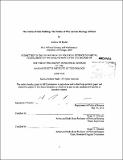The limits of state building : the politics of war and the ideology of peace
Author(s)
Radin, Andrew M. (Andrew Marc)
DownloadFull printable version (25.48Mb)
Alternative title
Politics of war and the ideology of peace
Other Contributors
Massachusetts Institute of Technology. Dept. of Political Science.
Advisor
Roger D. Petersen.
Terms of use
Metadata
Show full item recordAbstract
When can the international community build strong state institutions - such as security forces or electoral institutions - in post-conflict societies? An influential technical perspective argues that authority, resources, and expertise enable the international community to build its preferred institutions. In Bosnia, East Timor, and Kosovo, the international community established international administrations with executive powers and a state building mandate. Each international administrations had extensive authority, resources, and expertise, which make them crucial test cases for the technical perspective. I examined seventeen reform efforts in these societies related to security, representation, and revenue. While some institution-building efforts succeeded, many failed and provoked violence or undercut political development. To explain this variation, I propose a theory that specifies the mechanisms of the reform process. The theory is based on the interaction between the international administration, local elites, and the mass public of the post-conflict society. The mass public will protest when demands threaten nationalist goals, such as independence. Local elites, on the other hand, will privately obstruct reform to protect their informal patronage and corruption networks. International officials are ideologically committed to human rights and bureaucracy, which lead them to make overambitious demands. Moreover, competing goals and political friction among international organizations causes disagreement about which demands to make to local elites. The theory predicts that reform efforts only fully succeed when the international administration is unified and its demands threaten neither nationalist goals nor informal networks. I test the theory by conducting causal process tracing in the seventeen reform efforts. The case studies draw from fieldwork in each of these societies, as well as primary and secondary sources. Within these seventeen efforts, I identify fifty-seven stages of reform. Of these, forty confirm the theory's predictions and thirteen partially confirm the predictions. The case studies also demonstrate that the technical perspective, and other alternative hypotheses, cannot consistently explain state building. The dissertation has implications for broader state building efforts by the international community, and urges the adoption of an incremental approach to institution building that takes account of the realities of local politics and the corresponding limits of international authority.
Description
Thesis (Ph. D.)--Massachusetts Institute of Technology, Dept. of Political Science, 2012. Cataloged from PDF version of thesis. Includes bibliographical references.
Date issued
2012Department
Massachusetts Institute of Technology. Department of Political SciencePublisher
Massachusetts Institute of Technology
Keywords
Political Science.